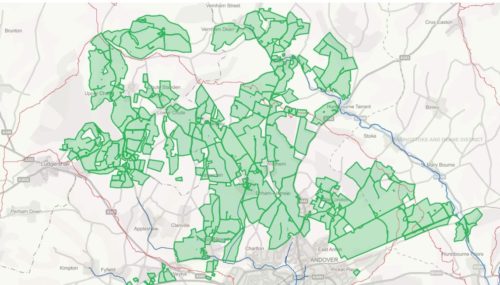Lead : Jon Capes jon@capesfarm.co.uk
Group members : 15
Area in Group (Hectares) : 5976
- Target Species: (BAP priority)
- Birds:
- Farmland: Barn owl, House sparrow, Kestrel, Linnet, Skylark, Yellowhammer, Corn Bunting, Lapwing.
- Woodland: Bullfinch, Marsh Tit, Song Thrush, Spotted Flycatcher, Tree Pipit, Woodlark
- Pollinators: Duke of Burgundy, Brown Hairstreak. And general farmland butterflies. Bumblebees and Solitary bees
- Mammals: Bat species, Brown hare, Hazel Dormouse, Harvest Mouse, Hedgehog
- Flora: found on calcareous and neutral grassland. Rare arable plants
- Management priorities
- Wildlife Corridors across farm boundaries through margins and hedgerows.
- Hedges and Edges. Rotational hedgerow management trimming. Plant new hedges and new margins. Plant more flowers in margins.
- Raptor nest boxes. Work with Hawk Conservancy Trust to add nest sites and improve habitat for Barn Owls and Kestrels. Small mammal research.
- Hazel Dormouse. Work with Test Valley dormouse group to locate dormice and improve habitats
- Improved biodiversity. Habitat creation. Actively manage more land for wildlife. Increase flower rich habitats for pollinators especially bees and butterflies.
- Protect and manage woodland for target species. Improve woodland connectivity with hedgerows. Encourage new plantings focussing on re-establishment of resistant Elm trees.
- Protect Lowland Calcareous areas and other low input grassland.
- Soil and water. Follow best practices to reduce the effects of farming on water in Test Valley NVZ catchment area. Identify ponds and discuss restoration or new pond construction. Improve soil health.
- Climate change. Target reduction of Carbon footprint through changed farming practices. Support NFU Carbon Zero 2040 target.
- Heritage and Culture. Protect and increase awareness of historic environment. Scheduled monuments, ancient by-ways.
- Community / Education. Engage local residents and schools through farm walks, parish magazine, press release and social media to demonstrate importance of farming and the public benefits that we provide.

